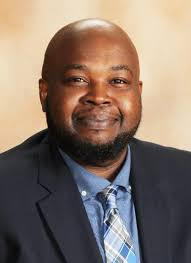
Rodney Robinson
Rodney Robinson teaches kids who are in “survival mode 24/7.” They aren’t just students, they’re detainees. And Robinson isn’t an average educator, but the National Teacher of the Year.
Robinson’s classroom sits behind the locked doors of the Richmond, Va., Juvenile Detention Center. He started teaching to honor his mother, who struggled to get an education as a child facing segregation and poverty in rural Virginia.
“She taught us to love each other, and how to love each other equitably and pass it on to the next generation,” Robinson, 40, said. “So, when I got to teaching, I always thought that I needed to educate those who need the most love. So, I’ve always chosen to work in high-need schools.”
Most of his students have been arrested because they committed “crimes of survival,” he said: They robbed people in order to eat or sold drugs because they were trying to provide for their families.
“If we start implementing a lot of social programs so they wouldn’t have to rely on these crimes to simply survive, then I think the number of kids who are incarcerated would drop,” he said.
The Council of State School Officers, who honored Robinson as the National Teacher of the Year, applauded his dedication, calling Robinson a model for teaching across the nation. “He creates a positive school culture by empowering his students — many of whom have experienced trauma — to become civically minded social advocates who use their skills and voices to affect physical and policy changes at their school and in their communities,” the Council said.
Robinson chose to work in the Juvenile Detention center in 2015 after a report showed Virginia led the nation in students referred to law enforcement.
He believed there was “no better way to learn about the school-to-prison pipeline than to go into an actual jail or prison and teach the children.” Robinson’s research found that some schools’ disciplinary practices do more harm than good. He therefore advocates for eliminating suspensions and keeping troubled students in school.
“We must create alternative programs that foster social and emotional growth. Why does the kid have to come to jail before they get anger management classes? Why can’t we have that in the schools? Why can’t we have some restorative justice practice? Some mindfulness? Just give them coping skills to help them deal with their life. Why don’t the schools offer that instead of just putting the kid out of school?” Robinson questioned.
Robinson has written three articles published by Yale University’s Teacher Institute. He has received numerous awards for his accomplishments in and out of the classroom, most notably the R.E.B. Award for Teaching Excellence. He has also worked with Pulitzer Award-winning author James Forman on developing curriculum units on race, class and punishment as a part of the Yale Teacher’s Institute.
In a recent article published on the National Education Association’s website, NEA President Lily Eskelsen Garcia said Robinson supports students who “feel unseen, unheard, unappreciated and undervalued in America.”
Robinson said he empowers his students by “giving them a voice and letting them know their voice matters.” He tailors his curriculum around the juvenile justice system. One of his lessons guides students through the history of prison and Virginia’s juvenile justice system. It allows students to “step outside of themselves,” Robinson wrote in his Teacher of the Year application, “and examine the system and circumstances that led to their incarceration.”
Robinson teaches the young detainees about their rights to inspire them to change themselves and their surroundings. “I’m trying to get them to understand that you are your biggest advocate. I teach them the proper way to go about advocating for themselves, whether it be in the courtroom or the classroom, advocate for yourself so that you can become a better person,” he said.